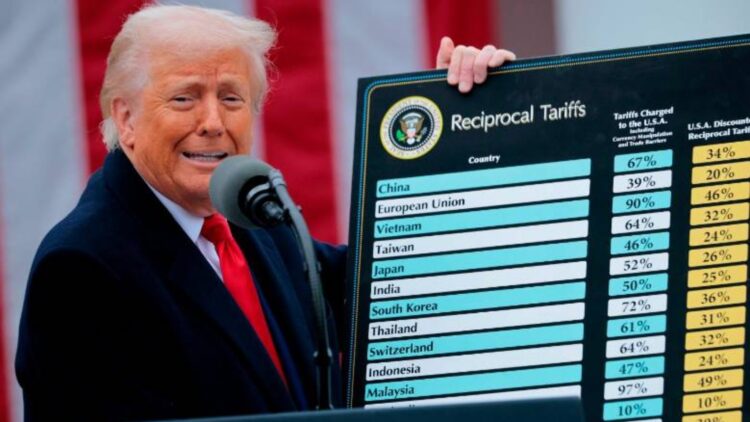World
U.S. Tariff Increases Set for August 1, Affecting Global Trade

Starting August 1, 2025, the United States will implement new tariffs on a wide range of imported goods, impacting consumers and businesses alike. This move, initiated by the Trump administration, is expected to increase prices for everyday products and could cost American households an additional $2,400 annually, according to research from the Yale Budget Lab.
The tariffs come as part of President Donald Trump‘s broader strategy to renegotiate trade agreements with various countries, including Mexico, Canada, and members of the European Union. White House spokesperson Karoline Leavitt stated that these measures aim to enhance the lives of American workers and consumers. Despite this intent, many experts caution that the tariffs may lead to significant inflationary pressures.
Details of the New Tariffs
The newly established tariffs will vary by country and product. For instance, Brazil will face a 50% tariff, while Canada and Mexico will see rates of 35%. Other countries like Japan and South Korea will incur tariffs of 25%, with the European Union facing a 30% increase. These adjustments follow Trump’s initial announcement of a blanket 10% tariff on all imports, which has since escalated based on negotiations with specific nations.
One of the significant concerns is the impact on prices for various consumer goods. Experts predict that items such as coffee, appliances, footwear, textiles, and other imported products will see price increases. The existing 50% tariff on copper, crucial for industries like automotive and construction, further exacerbates the situation.
U.S. Secretary of Commerce Howard Lutnick emphasized that while the new tariffs take effect on August 1, the administration remains open to negotiations with affected nations. “Nothing prevents countries from continuing to talk with us after August 1,” Lutnick stated, indicating a potential path for diplomatic discussions.
Global Reactions and Implications
The international community has responded with concern over the implications of these tariffs on global trade. Countries that are not in agreement with the U.S. tariff strategy are likely to retaliate, which could lead to a broader trade war. The situation is particularly tense with China, a country that has previously engaged in tit-for-tat tariff increases with the U.S.
Some analysts view Trump’s approach as aggressive and potentially self-sabotaging, suggesting it may alienate key trading partners while failing to deliver promised benefits to American consumers. The prospect of higher prices could dampen consumer spending, which is essential for economic growth.
As the implementation date approaches, businesses and consumers alike await clarity on how these tariffs will reshape the marketplace. The decision could lead to the withdrawal of major retailers, such as Shein and Temu, from the U.S. market, further limiting options for American consumers.
The unfolding situation highlights the delicate balance between protecting domestic industries and maintaining favorable trade relationships. Whether these tariffs will achieve their intended goals or lead to unintended economic consequences remains to be seen. The global economic landscape is poised for significant shifts as these changes take effect.
-

 Lifestyle5 months ago
Lifestyle5 months agoLibraries Challenge Rising E-Book Costs Amid Growing Demand
-

 Sports5 months ago
Sports5 months agoTyreek Hill Responds to Tua Tagovailoa’s Comments on Team Dynamics
-

 Sports5 months ago
Sports5 months agoLiverpool Secures Agreement to Sign Young Striker Will Wright
-

 Lifestyle5 months ago
Lifestyle5 months agoSave Your Split Tomatoes: Expert Tips for Gardeners
-

 Lifestyle5 months ago
Lifestyle5 months agoPrincess Beatrice’s Daughter Athena Joins Siblings at London Parade
-

 Science4 months ago
Science4 months agoSan Francisco Hosts Unique Contest to Identify “Performative Males”
-

 World5 months ago
World5 months agoWinter Storms Lash New South Wales with Snow, Flood Risks
-

 Science5 months ago
Science5 months agoTrump Administration Moves to Repeal Key Climate Regulation
-

 Business5 months ago
Business5 months agoSoFi Technologies Shares Slip 2% Following Insider Stock Sale
-

 Science5 months ago
Science5 months agoNew Tool Reveals Link Between Horse Coat Condition and Parasites
-

 Sports5 months ago
Sports5 months agoElon Musk Sculpture Travels From Utah to Yosemite National Park
-

 Science5 months ago
Science5 months agoNew Study Confirms Humans Transported Stonehenge Bluestones









